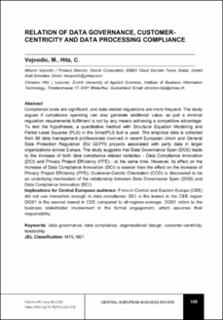Bitte benutzen Sie diese Kennung, um auf die Ressource zu verweisen:
https://doi.org/10.21256/zhaw-27444| Publikationstyp: | Beitrag in wissenschaftlicher Zeitschrift |
| Art der Begutachtung: | Peer review (Publikation) |
| Titel: | Relation of data governance, customer-centricity and data processing compliance |
| Autor/-in: | Vojvodic, Milomir Hitz, Christian |
| et. al: | No |
| DOI: | 10.18267/j.cebr.310 10.21256/zhaw-27444 |
| Erschienen in: | Central European Business Review |
| Band(Heft): | 11 |
| Heft: | 5 |
| Seite(n): | 109 |
| Seiten bis: | 148 |
| Erscheinungsdatum: | 2022 |
| Verlag / Hrsg. Institution: | Prague University of Economics and Business |
| ISSN: | 1805-4854 1805-4862 |
| Sprache: | Englisch |
| Schlagwörter: | Data governance; Data compliance; Customer-centricity; Organizational design; Leadership |
| Fachgebiet (DDC): | 650: Management |
| Zusammenfassung: | Compliance costs are significant, and data related regulations are more frequent. The study argues if compliance spending can also generate additional value, as just a minimal regulation requirements fulfilment is not by any means achieving a competitive advantage. To test the hypotheses, a quantitative method with Structural Equation Modelling and Partial Least Squares (PLS) in the SmartPLS tool is used. The empirical data is collected from 98 data management professionals involved in recent European Union and General Data Protection Regulation (EU GDPR) projects associated with party data in larger organizations across Europe. The study suggests that Data Governance Span (DGS) leads to the increase of both data compliance related variables - Data Compliance Innovation (DCI) and Privacy Project Efficiency (PPE) - at the same time. However, its effect on the increase of Data Compliance Innovation (DCI) is weaker than the effect on the increase of Privacy Project Efficiency (PPE). Customer-Centric Orientation (CCO) is discovered to be an underlying mechanism of the relationship between Data Governance Span (DGS) and Data Compliance Innovation (DCI). Implications for Central European audience: Firms in Central and Eastern Europe (CEE) did not use innovation enough in data compliance. DCI is the lowest in the CEE region DGS1 is the second lowest in CEE compared to all-regions-average. DGS1 refers to the business stakeholder involvement in the formal engagement, which assumes their responsibility. |
| URI: | https://digitalcollection.zhaw.ch/handle/11475/27444 |
| Volltext Version: | Publizierte Version |
| Lizenz (gemäss Verlagsvertrag): | CC BY-NC-ND 4.0: Namensnennung - Nicht kommerziell - Keine Bearbeitungen 4.0 International |
| Departement: | School of Management and Law |
| Organisationseinheit: | Institut für Wirtschaftsinformatik (IWI) |
| Enthalten in den Sammlungen: | Publikationen School of Management and Law |
Dateien zu dieser Ressource:
| Datei | Beschreibung | Größe | Format | |
|---|---|---|---|---|
| 2022_Vojvodic-Hitz_Data-governance-customer-centricit-data-processing-compliance.pdf | 720.24 kB | Adobe PDF |  Öffnen/Anzeigen |
Zur Langanzeige
Vojvodic, M., & Hitz, C. (2022). Relation of data governance, customer-centricity and data processing compliance. Central European Business Review, 11(5), 109–148. https://doi.org/10.18267/j.cebr.310
Vojvodic, M. and Hitz, C. (2022) ‘Relation of data governance, customer-centricity and data processing compliance’, Central European Business Review, 11(5), pp. 109–148. Available at: https://doi.org/10.18267/j.cebr.310.
M. Vojvodic and C. Hitz, “Relation of data governance, customer-centricity and data processing compliance,” Central European Business Review, vol. 11, no. 5, pp. 109–148, 2022, doi: 10.18267/j.cebr.310.
VOJVODIC, Milomir und Christian HITZ, 2022. Relation of data governance, customer-centricity and data processing compliance. Central European Business Review. 2022. Bd. 11, Nr. 5, S. 109–148. DOI 10.18267/j.cebr.310
Vojvodic, Milomir, and Christian Hitz. 2022. “Relation of Data Governance, Customer-Centricity and Data Processing Compliance.” Central European Business Review 11 (5): 109–48. https://doi.org/10.18267/j.cebr.310.
Vojvodic, Milomir, and Christian Hitz. “Relation of Data Governance, Customer-Centricity and Data Processing Compliance.” Central European Business Review, vol. 11, no. 5, 2022, pp. 109–48, https://doi.org/10.18267/j.cebr.310.
Alle Ressourcen in diesem Repository sind urheberrechtlich geschützt, soweit nicht anderweitig angezeigt.